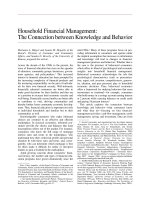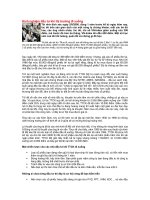Tài liệu Question about broker: Broker''''s roles in insurance market doc
Bạn đang xem bản rút gọn của tài liệu. Xem và tải ngay bản đầy đủ của tài liệu tại đây (57.51 KB, 3 trang )
BROKER’S ROLES
IN INSURANCE MARKET
Overview
Insurance Market in Vietnam is developing with the economy. With the flow of foreign
investment, a number of foreign insurance companies were granted business licenses
which has created a more competitive environment. As an organic part of the market,
insurance brokers always play a extremely role in insurance market. However, the word
“broker” for almost Vietnamese does not speak much for itself.
Followings are some analysis which will give an overview picture of a broker operation in
the market and understand why they are indispensable.
What do insurance brokers do?
The broker's task is to help you identify the risks that you or your business may be
exposed to. He or she can then advise you on what risks should be insured against, and
then if you agree, the broker will canvass the insurance market to obtain the best
insurance protection to meet your needs, at a competitive price.
The broker then arranges the insurance policy, and documentation. He or she can also
help you with information when required, especially if you have a claim, and your broker
will remind you when policies are due for renewal or amendment.
Why use a broker ?
In personal and business matters, the correct insurance is vital. Wrong or inadequate
protection can lead to disastrous consequences for individuals, families or businesses.
The right advice makes all the difference and prevents costly mistakes.
Insurance brokers are specialists in insurance protection. They are independent, have an
in-depth working knowledge of the insurance market, are able to provide professional
objective advice on identifying risks and exposures, and recommend cost effective
solutions.
An insurance broker is an independent professional adviser who acts for you.
How are insurance brokers paid ?
A commission is the most common form of payment by the insurance company to the
broker who places your business. This commission is paid for the work the broker carried
out, including documentation etc.
Who is the broker working for ?
Insurance brokers are instructed by you, and at all times, act on your behalf. They are not
agents of the insurance company. Their independence ensures that you benefit from the
convenience, knowledge, choice, innovation and their high level of professionalism:-
Convenience: A broker can arrange all the insurance and risk protection you need.
1
Probably only one meeting is necessary to identify your needs, and he or
she can develop a comprehensive insurance proposal for you.
Knowledge: A broker has daily contact with many insurance companies, and know
where to obtain the best insurance protection at the best cost.
Choice: A broker deals directly with most insurance companies, and can present
your risks in the most effective way. He or she can canvass the market to
obtain competitive terms and costs, and then suggest a contract which best
fits your needs.
Innovation: Many brokers are now helping their clients reduce risks through modern
risk management procedures and systems, thereby reducing their
dependence upon insurance, with considerable cost savings.
Your broker will provide on-going services
Insurance brokers undertake all the detailed discussions and negotiations on insurance
matters for you, leaving you free to get on with running your business or tending to your
own daily responsibilities.
As your circumstances change, the broker will review your policies ensuring that the policy
is appropriate, and that you remain well protected. He or she may suggest amendments to
the policies in the light of market changes or changes in your business or domestic
situation. This expertise is aimed at saving insurance costs and improving the
effectiveness of the cover.
What is risk management ?
Many brokers are now suggesting that their clients adopt risk management procedures
and systems to reduce their risks, and make savings on their insurance premiums. Risk
management is all about taking precautions to reduce the risk of loss - this might include
fitting smoke alarms or sprinkler systems, or extra security on windows and doors. In
commercial premises. It might involve safer working practices within the factory or more
staff training in safety, or even practise fire drills and evacuation procedures. There are
financial risk management techniques as well for larger businesses which are all designed
to lower insurance risk exposures and costs.
Claims
A broker provides a very useful service in processing insurance claims. An integral part of
the brokers service is to lodge claims on your behalf, completing all the necessary
documentation and co-ordinating the loss adjuster, the insurance company and the
tradesmen necessary to make an repairs.
A broker can ensure that no time is lost in processing the claim by ensuring all the
necessary information is available to allow the insurance company to pay the claim
promptly.
Is an insurance broker the same as an insurance agent ?
No, there is a very big difference between the two. The agents acts on behalf of one or
more insurance companies and can only sell what they have to offer. The broker acts on
behalf of you, the client. The broker is legally obliged to act in your best interests, is not
tied to any insurer and can arrange the best protection for you at a competitive price.
2
Isn't it cheaper to go to the insurance company direct ?
Insurers have to pay for administration by their own staff, and many direct sellers incur
heavy advertising costs, so you wont necessarily find it cheaper to go direct to the insurer.
Not all policies are the same so you would have to telephone or call around at about eight
major companies to get an impression of what is available.
Brokers are often able to get more competitive prices for insurance because they handle
much of the administration for the insurer, and because they place a volume of business
which earns them cheaper prices, which they pass on to you.
Consumers should also be wary of a "cheap product". Brokers select the most suitable
cover for your particular needs which may not always be the cheapest.
3









